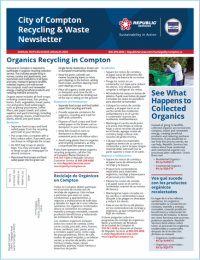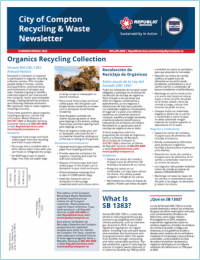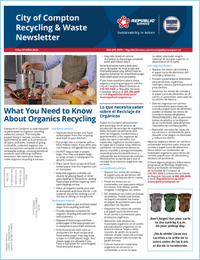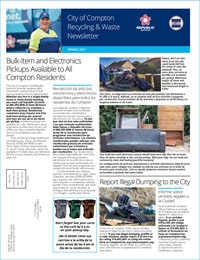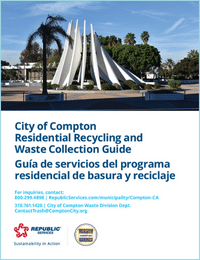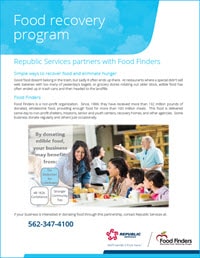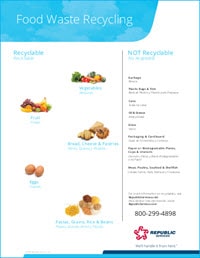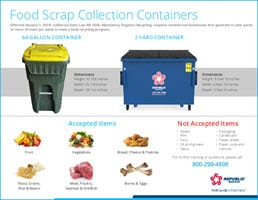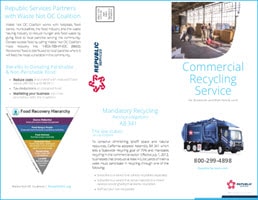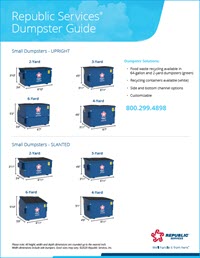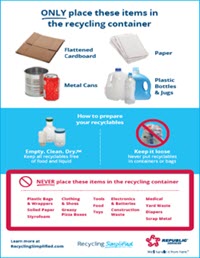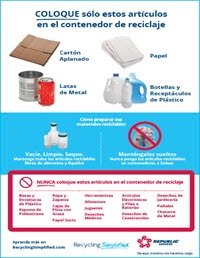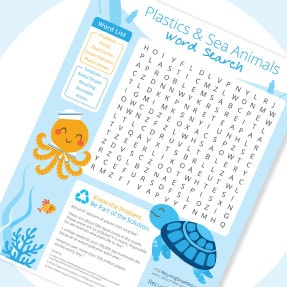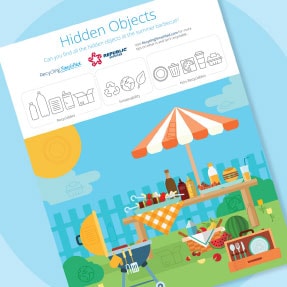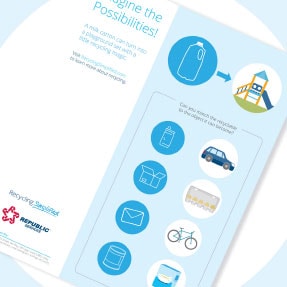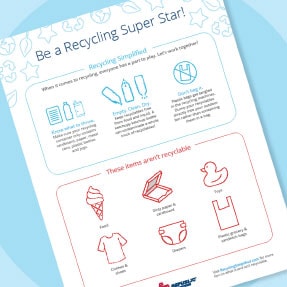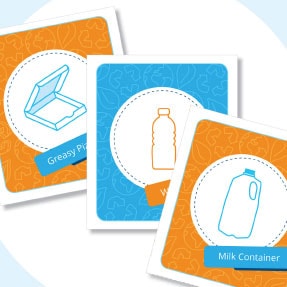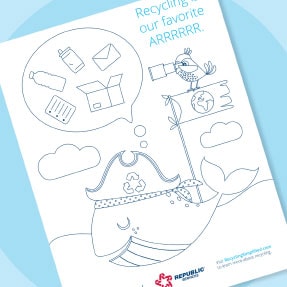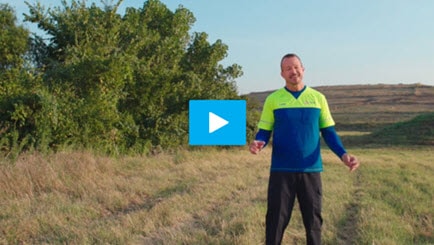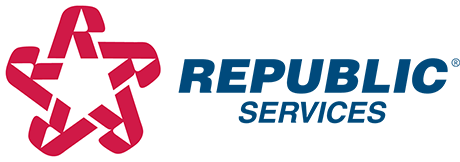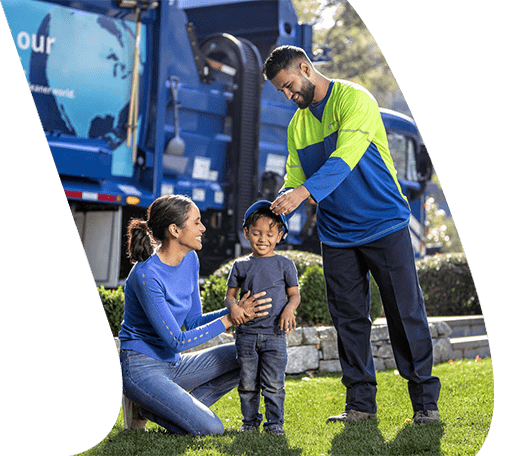
Republic Services of Compton, CA
Republic Services provides exclusive recycling and waste collection services for residential and commercial accounts for the City of Compton. We offer one-stop shopping for all of the city's waste removal needs. Although we specialize in recycling and solid waste collection, our services go far beyond just emptying the trash bins.
Compton, CA customer service
Repair/replace questions
Monday – Friday, 7:30 am – 5:00 pm
Saturday, 8 am - 12:00 pm
12949 Telegraph Rd.
Santa Fe Springs, CA, 90670
Stop/start service & billing questions
City of Compton
310-605-5524
Container size
- Trash: One (1) brown 96-gallon - additional fees for additional trash carts.
- Recycling: One (1) gray 64-gallon cart
- Yard Waste: One (1) green 64-gallon cart
There is no charge for additional yard waste or recycling containers.
Holiday schedule
We observe the following holidays:
- New Year’s Day
- Memorial Day
- Fourth of July
- Labor Day
- Thanksgiving Day
- Christmas Day
If your pickup day falls on one of these holidays, it will be delayed by one day.
Bulky item collection services
Large household items that do not fit inside the trash cart need to be scheduled for a bulk item pickup. Please call our customer service department at least 48 hours in advance of your collection day at 800-299-4898 to schedule a pickup.
- Compton residents are entitled to 1 free pick-up per quarter per year.
- Items collected shall be limited to 6 items per pick up.
- Examples of bulk items would be TV, couch, washer/dryer, etc.
- Items collected shall be a combination of loose large items not to exceed an approximate equivalent of four (4) cubic yards and two (2) individual large items such as a TV, couch, or water heater.
Compton newsletters and collection guides
How can we help?
See our FAQs for more details on the proper household hazardous waste (HHW) disposal of motor oil, electronics, paint, and more.
Additional resources
Click on an image below to download your resource guide.
Food recovery & food donation
If you would like to donate food or find a local food bank near you, the local non-profits below provide services in the Southern California area.
Los Angeles
Orange County
Committed to serve
Through our National Neighborhood Promise (NNP) program, we provide funding for neighborhood revitalization and sustainability projects in communities where Republic Services customers and employees live and work. Our goal is to partner with exceptional local nonprofits to create sustainable neighborhoods through grants, in-kind donations and employee volunteerism.
Since 2018, we've positively impacted nearly 20 million people through our community investments.
Recycling simplified videos
Check out these 15-second videos for quick tips on recycling basics.
Kid's Corner
Trash day maze
Help the truck driver navigate his route to pick up the neighborhood’s trash and recycling. Download
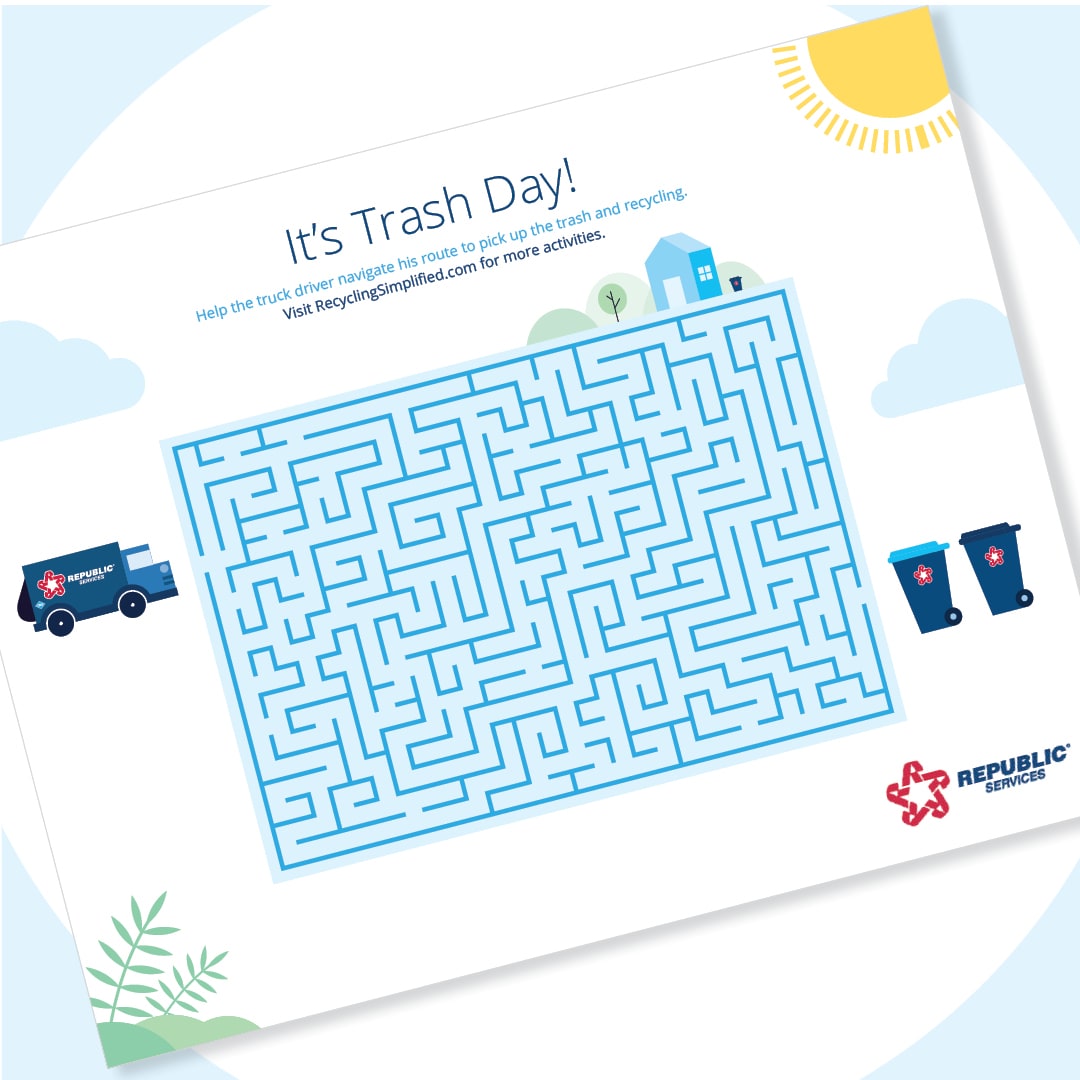
Electronics word search
Our electronics are tangled. Can you help find which electronics are recyclable? Download
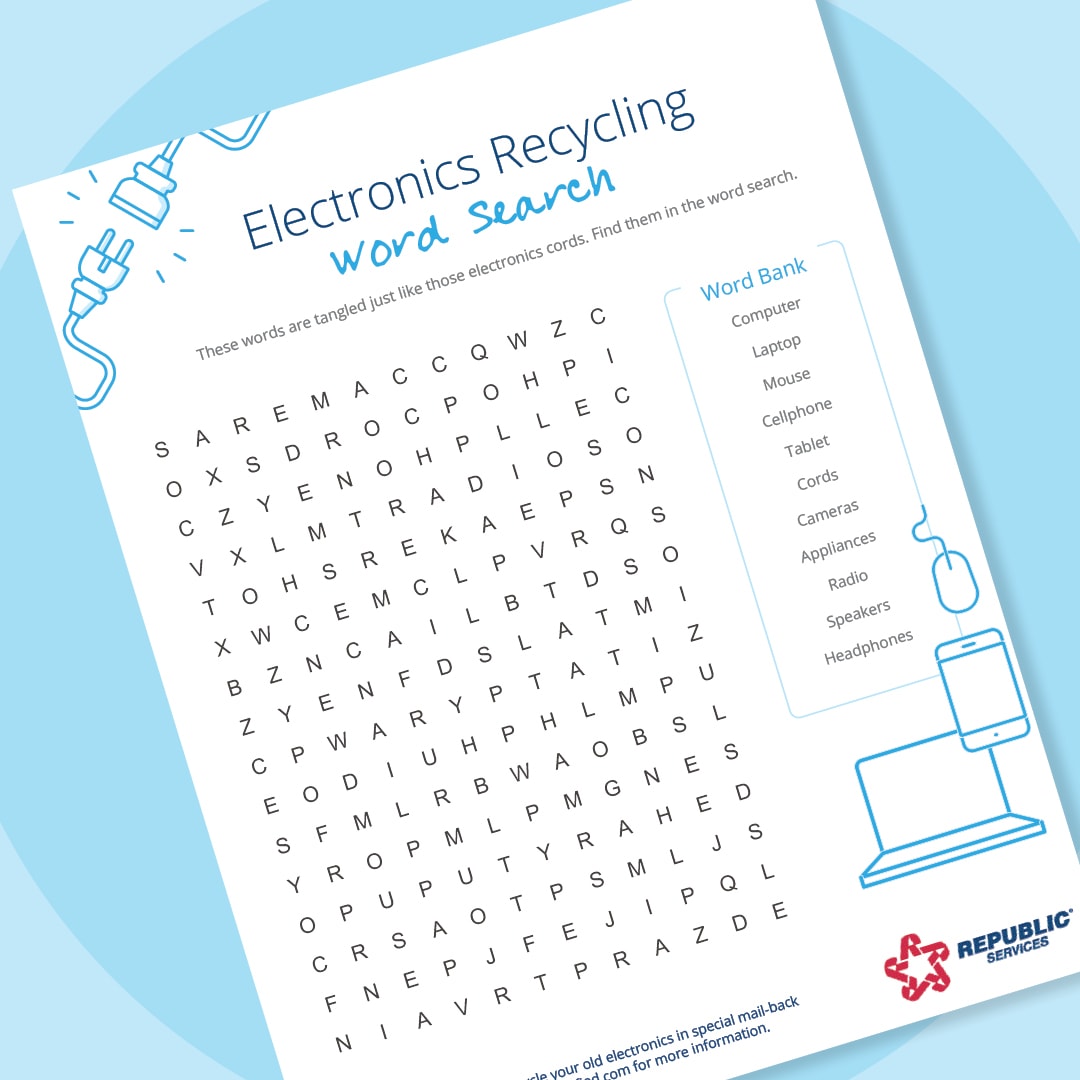
Outdoors bingo
Take a walk around your neighborhood with this Bingo sheet. Find four in a row! Download
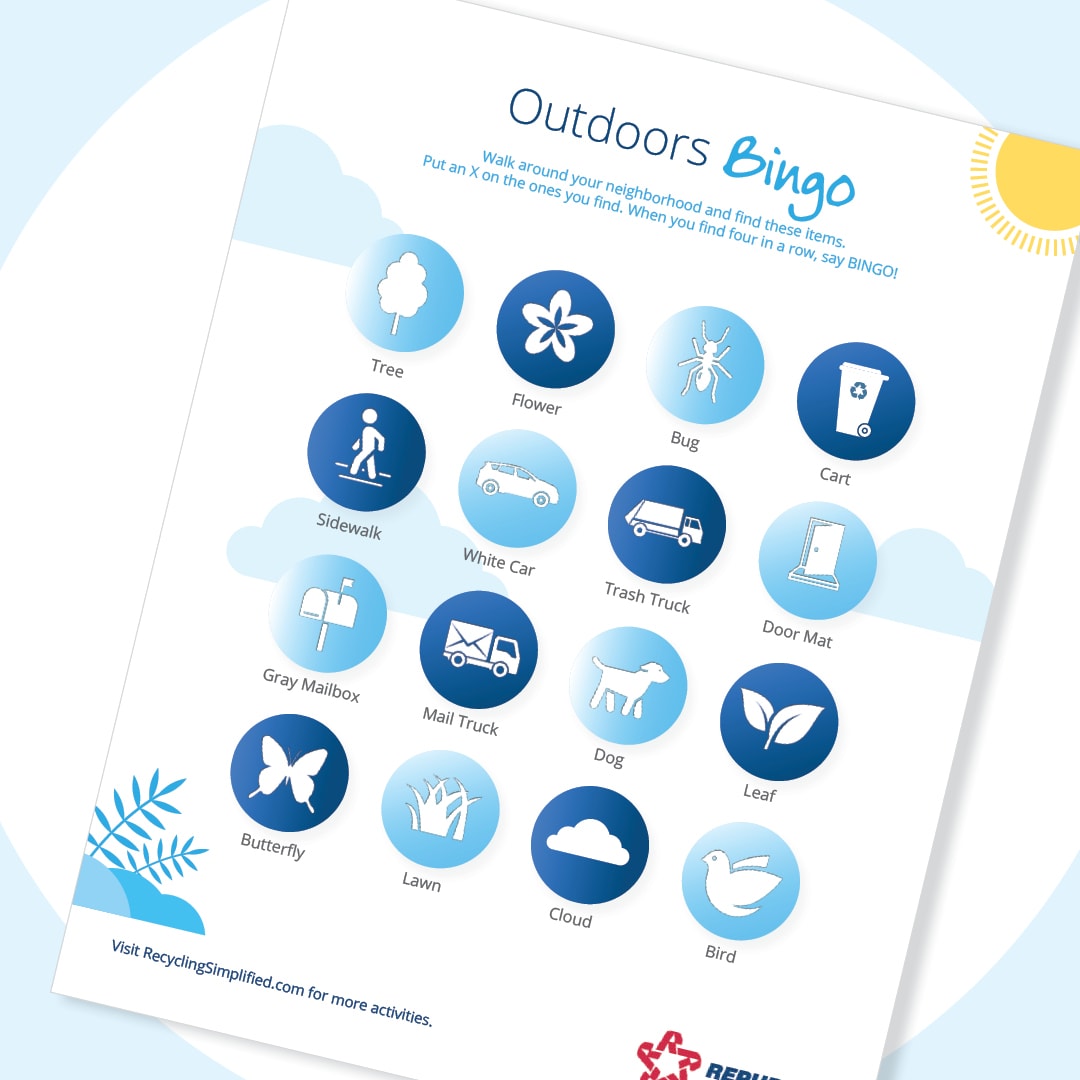
Take a virtual field trip
Take your students on a virtual field trip of how a recycling center and a modern landfill works. These videos are designed to inform specific lessons in 3rd-5th grade, 6th-8th grade, and 9th-12th grade, but can also be used outside of those lessons to take your students on a journey through the process!
Recycling center video tour
3rd - 5th grade video is featured below
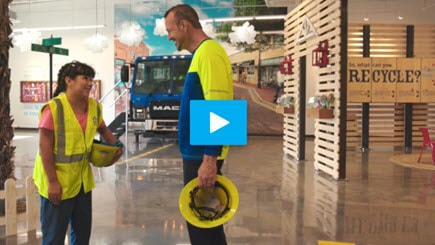
FAQs
Collection Guidelines & Reporting an Issue
Residents
- Face carts toward the street with wheels against the curb or gutter the night before or by 6:00 am on your scheduled service day, or after 5:00 pm the night before.
- Allow at least two feet between carts and 5 feet between carts and other objects
- Make sure lids are securely shut--materials should not extend beyond the container rim.
- There are several ways to handle extra waste. See our FAQ on bulky waste pick-up.
- Do not place hot ashes, dirt, rock, concrete, or hazardous items in your carts.
Apartments & Businesses
Containers must be easily accessible – if containers are blocked (ex. by parked cars), we will not be able to service the container and you may need to pay an additional charge if you request a return trip pick-up.Please call customer service at 800-299-4898.
Please call customer service at 800-299-4898.
Recycling Questions
These items are not recyclable. If items are in good condition, please consider donating.
- Ceramics (dishes, etc.) - consider donating
- Clothing - consider donating
- Disposable diapers
- Drinking glasses - consider donating
- Food waste
- Light bulbs
- Mirrors - consider donating
- Plastic wrap
- Scrap metal - consider donating
- Styrofoam
- Wax paper
- Window or safety glasses - consider donating
Non-recyclables contaminate recycling loads, and need to be removed during the sorting process. Some items may also contaminate clean recyclable items (ex. pasta sauce jar with sauce still in it, can soak into clean office paper which is then no longer recyclable either).
If our drivers notice a lot of contamination in your recycle cart or bin, we may not be able to service it as recycling and may tag it to have it serviced as trash (in which case you may be charged).
Yard trimmings
- Flower trimmings
- Tree trimmings (twigs/branches must be 4 ft or less in length, and less than 6 inches in diameter)
- Leaves, grass, brush, and weeds
- Untreated and unpainted wood
Unacceptable Materials for Green Waste Cart:
- Dog waste or pet waste from any animal
- Diapers
- Food-soiled paper (napkins and paper towels, uncoated paper: plates, cups, bowls & pizza boxes)
- Glass, metal, plastic
- Hot ashes or briquettes
- Large amounts of soil or sod
- Plastic bags, or plastic of ANY kind
- Rocks, concrete, dirt, sand
- Wood that has been treated, coated, or painted
- Particle board
Compostable plastics are NOT allowed in the organics cart.
- The compost facility is not able to accept other “compostable plastic” items (such as corn-based utensils, Green Strip cups, etc.) even if they are BPI-Certified, because these items do not break down fast enough or completely.
- Compostable plastics are also not recyclable. These items need to be thrown in the brown landfill cart.
Each residence receives one set of carts, consisting of trash, recycling, and yard waste. Additional trash containers are available at a fee. There is no charge for additional yard waste or recycling containers.
Every year, the City of Compton promotes GREEN practices which include the collection and disposal of Holiday Christmas trees. This service ensures trees are recycled appropriately and minimize the amount of waste added to our landfills. Service is scheduled to begin the day after Christmas and will run for a four-week period at no additional costs to residents.
Residential holiday tree collection
Christmas/holiday trees will be collected for the first 2 weeks immediately following December 25th. Please remove all decorations, ornaments, lights, garland, and tinsel, as well as the stand. If your tree is more than 10 feet tall, please cut it in half. When you set your tree at the curb, it should be bare.
Commercial / multi-family dwellings holiday trees
Commercial and multi-family customers may receive a free roll-off or temp bin to collect their holiday trees. This service will be provided for the first 2 weeks immediately following Christmas Day. Please remove all decorations, ornaments, lights, garland, and tinsel, as well as the stand.
Food scraps (raw or cooked):
- Fruits
- Vegetables
- Dairy products
- Bread, grains, pasta
- Meat & seafood (including bones)
- Prepared or processed foods (chips, sandwiches, etc – remove packaging)
Unacceptable materials for food waste cart:
- Dog waste or pet waste from any animal
- Diapers
- Food-soiled paper (napkins and paper towels, uncoated paper: plates, cups, bowls & pizza boxes)
- Glass, metal, plastic
- Hot ashes or briquettes
- Large amounts of soil or sod
- Plastic bags, or plastic of ANY kind
- Rocks, concrete, dirt, sand
- Wood that has been treated, coated, or painted
- Particle board
Multi-Family Recycling Information
Recycling conserves natural resources, like trees and water, saves energy. Composting food scraps helps return valuable nutrients to the soil and reduces the amount of organic material ending up in landfills. Both are important in helping the City of Compton meet county and state-mandated goals for reducing waste disposed of in local landfills.
Cardboard should be flattened before being placed in the recycling cart/bin.
Business Recycling & Organic Bins
Mixed recycling materials:
- Paper (white, colored, fax, gloss)
- Envelopes, file folders
- Newspapers, magazines, phone books
- Cardboard (flattened)
- Glass bottles & jars
- Aluminum & tin cans
- Plastic food & beverage containers*
- Triple-rinsed plastic chemical bottles*
- Carbon paper & treated papers
- Transparencies & photographs
- Food waste & food soiled papers
- Wood
- Glass (except bottles)
- Metals (except aluminum & tin cans)
- Landscape waste
- Carpet
- Bathroom waste
- Hazardous & medical waste
Note:
- Add 10 inches to width measurement to include side pocket dimensions.
- Add 7 inches to height measurement for wheeled containers.
- Height dimensions listed are the measurements at the container's highest point.
- The actual loading level/height may be lower.
1 cubic yard
Size: 72" X 29" X 24"
Wheels: Yes
2 cubic yards
Size: 72" X 44" X 35"
Wheels: Yes
3 cubic yards
Size: 72" X 53" X 42"
Wheels: Yes
4 cubic yards
Size: 72" X 58" X 51"
Wheels: Yes
6 cubic yards
Size: 72" X 71" X 66"
Wheels: No
7 cubic yards
Size: 72" X 76" X 72"
Wheels: No
8 cubic yards
Size: 72" X 91" X 72"
Wheels: No
NOTE: A separate container for food waste, and a separate container for green waste are available. Please do not mix commercial food waste and commercial green waste in one container, as they are processed at different facilities.
Composting for business
Close nature's loop by composting your food scraps. Rather than going to the landfill, food scraps can be processed into compost, which enriches soil naturally.
Benefits of composting:
- Potential to reduce disposal costs
- Improve your image as an environmental leader
- Reduce waste going to a landfill
- Prevent greenhouse gas emissions
Compostable materials:
- Food scraps: fruits, vegetables, meat, seafood, dairy, eggs, bread, pasta, tea bags, coffee grounds
- Yard trimmings and wood: All plant and floral material, wood produce crates, wood scraps, sawdust
Unacceptable materials:
- Plastics (all types)
- Styrofoam
- Glass
- Metals
- Grease trappings or tallow
- Liquids
State law requires more businesses to compost, January 2019
Under State of California laws AB 341 and AB 1826, certain businesses and institutions are required to recycle and compost. As of January 1, 2019, the State requires more sites to have organics collection service; businesses and multi-family properties that generate 4 or more cubic yards of solid waste per week must have organics collection service.
Materials that must be composted include food waste, green waste, landscape and pruning waste, non-hazardous wood waste, and food-soiled paper.
AB 341 has required recycling at many businesses since July 1, 2012. Materials that must be recycled include bottles, cans, paper, and cardboard.
For more information about the State’s mandatory commercial recycling and composting laws, visit
Special & Household Hazardous Waste
If you live in a Single Family home, you can contact our customer service representative at 800-299-4898.
If you live in a Multi-Family Unit or are a Commercial business, please contact the City at 310-605-5524.
No.
Republic Services does not collect or accept hazardous waste or medical waste.
The County of Los Angeles conducts Household Hazardous Waste round-ups throughout the year to properly dispose of such materials at NO charge. For more information on dates and locations, please go online and visit
Working with CalRecycle the City of Compton has developed and program to assist with the safe disposal of used oil for residential customers. For service call 800-449-7587 to request a pickup.
Additional certified collection centers and oil filter exchange events can be found at
Electronic waste such as TV’s computers, printers, and monitors can be collected as part of your bulky-item collection program. Call 800-299-4898, 48 hours before your service day to schedule a pickup.
Visit
Batteries should not be placed inside any residential cart.
Common batteries such as AA, AAA, C cells, D cells and button cell batteries (e.g. hearing aid batteries) may contain a corrosive chemical that can cause burns. For proper disposal, visit LA Public Works battery disposal locations
California residents and businesses can now recycle leftover paint for free at local retail stores. For program details and locations, visit
The City of Compton has a Sharps program with CalRecycle offering free Sharps Containers. Empty containers can be picked up free of charge at the Water Utility Division Office. 205 S. Willowbrook Ave. Compton, California, 90220 (City Hall first floor).
The Sharps container once filled can be taken to any Household Hazard Waste Roundup in Los Angeles County. To find the next event location you can call 800-253-1652 or
Medical sharps should never be placed into household or public waste or recycling containers. All sharps should be placed into a SHARPS disposal container immediately after use to reduce the chance of injuries caused by loose sharps. Medical sharps that are improperly disposed of can injure anyone that comes in contact with your trash including Republic Services crews and may pose a public health hazard.
You may also visit
How to dispose of light bulbs depends on which type of light bulb(s) you have. Some light bulbs contain hazardous substances such as mercury, lead and arsenic, which are harmful to human health and the environment, even in small quantities. Light bulbs containing these substances should never be placed in any carts, bins or dumpsters. Visit the
The California Green Building Standards Code (Cal Green) applies to all cities in California and mandates as of January 1, 2017, that all new building construction develop a waste management plan that includes diversion of at least 65% of construction and demolition material from landfills, through recycling and or reuse.
Republic Services offers many services for your construction waste, including compliance with CALGreen diversion requirements. To order a container for C&D waste, call 800-299-4898 for guidance.
California's Mandatory Commercial Recycling and Organics Waste Recycling Law
In October 2014 Governor Brown signed AB 1826 Chesbro (Chapter 727, Statutes of 2014), requiring businesses to recycle their organic waste on and after April 1, 2016, depending on the amount of waste they generate per week. This law also requires that on and after January 1, 2016, local jurisdictions across the state implement an organic waste recycling program to divert organic waste generated by businesses, including multifamily residential dwellings that consist of five or more units (please note, however, that multifamily dwellings are not required to have a food waste diversion program). Organic waste (also referred to as organics throughout this resource) means food waste, green waste, landscape, and pruning waste, nonhazardous wood waste, and food-soiled paper waste that is mixed in with food waste. This law phases in the mandatory recycling of commercial organics over time, while also offering an exemption process for rural counties. In particular, the minimum threshold of organic waste generation by businesses decreases over time, which means an increasingly greater proportion of the commercial sector will be required to comply.
Effective December 31, 2020, businesses with more than 2 cubic yards of solid waste per week are required to recycle their food waste. Please call 1-800-299-4898 to learn about the food waste recycling program.
A Recycling Coordinator is available to meet at you at your City of Whittier business and customize a program. Please call 1-800-299-4898 to ask for Recycling Coordinator assistance.
In 2016, Senate Bill 1383 was signed into law to combat climate change and reduce landfill methane emissions. Methane is a climate super pollutant, 84 times more potent than carbon dioxide. Organics like food scraps, yard trimmings, paper, and cardboard currently make up 50% of what Californians dump in landfills. Diverting organic waste to recycling can significantly reduce these local air quality emissions. The goal was to reduce organic waste disposal by 50% by 2020 and 75% by 2025.
What Does It Mean?
This law requires your waste hauler to collect your organic waste, including food waste, and dispose of it in a more sustainable manner, instead of simply taking it to the landfill.
What Is Organic Waste?
Organic waste includes food waste (vegetable and fruit scraps, eggshells and meat—anything you eat and any byproduct of your meal), food-soiled paper (napkins, paper plates, paper containers, pizza boxes, coffee filters), and green material (landscaping, pruning waste, sticks, leaves, wood).
Who Is Affected?
Everyone. Residents, multi-family properties and complexes, businesses, schools, and public agencies all need to comply with the law and enroll in an organic recycling program.
How Is It Processed?
The law requires a significantly higher level of processing of organic material than current standards. Processors are required to monitor, track and ultimately limit the amount of organic material sent to landfills after processing, requiring additional processing and the development of new systems to remove contaminants and excess organic material that may have previously been sent to the landfill as residue.
Dumpsters
- Debris boxes, from 6 to 40 yards, are available for household remodeling, landscape projects, site clean-up, construction & demolition, and other projects.
- Rates for roll-offs vary depending upon box size and filled weight.
- Email
customer service here , or call 800-299-4898 for information or to place an order.
The following materials cannot be collected in roll-off containers:
- Asbestos
- Batteries
- Food waste
- Household hazardous waste
- Liquids
- Paint
- Oils
- Medical waste
- Tires
- Televisions
- Monitors and white goods (appliances) containing chlorofluorocarbons (CFCs)
